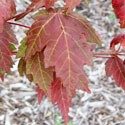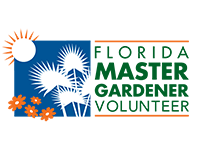The Neighborhood Gardener – November
Happy gardening!
A Tree of a Different Color
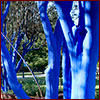 Starting October 24th, the University of Florida presents "The Blue Trees," a social commentary and natural art exhibit by Konstantin Dimopoulos. Dr. Gail Hansen, a faculty member with the Center for Land Use Efficiency, helped select which trees to paint; "The Blue Trees" exhibit showcases Florida-Friendly tree choices for north central Florida. More
Starting October 24th, the University of Florida presents "The Blue Trees," a social commentary and natural art exhibit by Konstantin Dimopoulos. Dr. Gail Hansen, a faculty member with the Center for Land Use Efficiency, helped select which trees to paint; "The Blue Trees" exhibit showcases Florida-Friendly tree choices for north central Florida. More
Herbicide Carryover
Animal manures and composts are excellent sources of nutrients and organic matter for the fruits and vegetables in your home garden. But you should be aware that some farm manures and composts may be tainted with herbicides that could cause poor seed germination, reduced yield, misshapen fruit, and more. Residual herbicide activity can occur after livestock pastures have been treated, and may be found on horse or livestock manure, composted manures, pasture hay, or grass clippings. Before acquiring compost or manure, ask livestock owners what their animals were fed or what herbicides were applied to their pastures. More from North Carolina Cooperative Extension
Plant of the Month: Cast Iron Plant
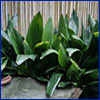 This tough-as-nails plant makes a reliable accent or groundcover in any shady corner of the landscape. Cast iron plant can be grown outdoors throughout Florida. It can even be grown as a bulletproof houseplant, and it's especially suited for homes and offices that don't receive much light.
Cast iron plant prefers a rich, fertile soil, but it will tolerate a range of soil conditions. More
This tough-as-nails plant makes a reliable accent or groundcover in any shady corner of the landscape. Cast iron plant can be grown outdoors throughout Florida. It can even be grown as a bulletproof houseplant, and it's especially suited for homes and offices that don't receive much light.
Cast iron plant prefers a rich, fertile soil, but it will tolerate a range of soil conditions. More
November in Your Garden
Create a display of fall colors with cool season annuals like pansies. Learn more in "Gardening with Annuals in Florida." Now that temperatures are lower, use dormant oil sprays to control scale insects on trees and shrubs.
For more month-by-month gardening tips, check out the Florida Gardening Calendar. Three different editions of the calendar provide specific tips for each of Florida's gardening regions—North, Central, and South. More
Friend or Foe? Foe: Feral Hogs
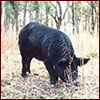 Feral hogs have become quite a nuisance for Floridians, rooting up and destroying large portions of turfgrass, landscape, and nature trails. They also carry diseases and can be dangerous if cornered. For gardeners, excluding hogs using fencing can be an effective (but expensive) control option for relatively small areas. Chain link fences or heavy-gauge hog wire buried at least 12 inches under the ground with sturdy supports and posts, and various types of mesh or multi-stranded electric fence provide the best results. More
Feral hogs have become quite a nuisance for Floridians, rooting up and destroying large portions of turfgrass, landscape, and nature trails. They also carry diseases and can be dangerous if cornered. For gardeners, excluding hogs using fencing can be an effective (but expensive) control option for relatively small areas. Chain link fences or heavy-gauge hog wire buried at least 12 inches under the ground with sturdy supports and posts, and various types of mesh or multi-stranded electric fence provide the best results. More
Featured Shows on Gardening in a Minute
Success Stories
- We're looking for inspiring, Florida-Friendly success stories from your county. Submit yours today to Wendy Wilber.

